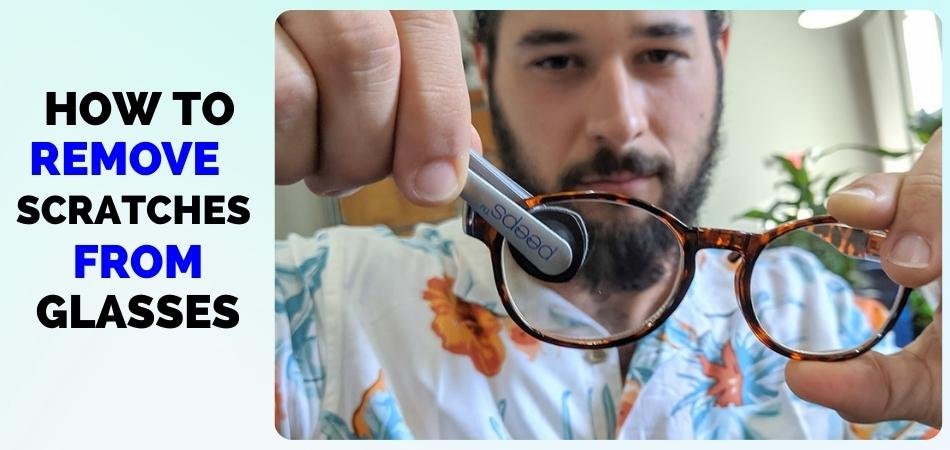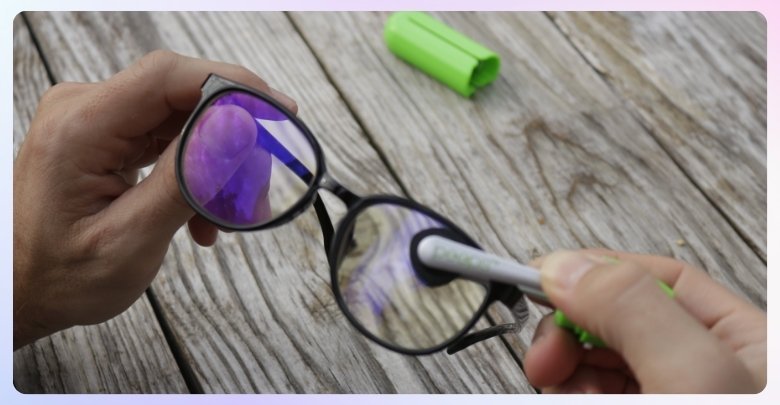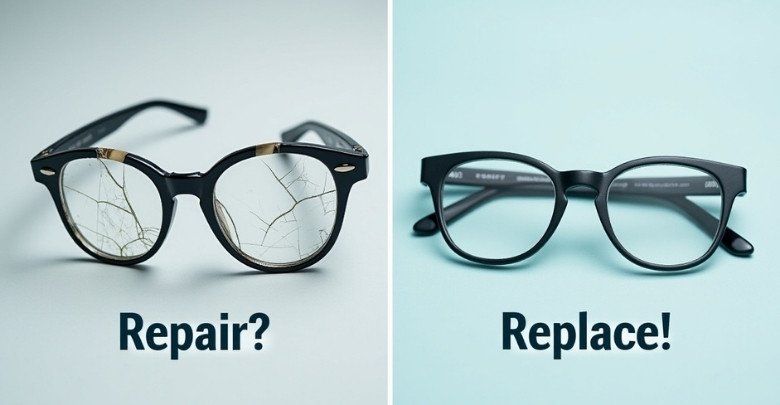A scratch on a pair of glasses can be a real hassle, making it difficult to see clearly and causing daily frustration. Whether it’s a favorite pair of reading glasses or stylish sunglasses, keeping lenses clean and scratch-free is important. If you’re curious about how to remove scratches from glasses, then you are not alone.
To remove scratches from glasses, start by cleaning them with a microfiber cloth or tools like peeps by Carbon Klean. For light scratches, use toothpaste or a baking soda paste and rub gently. Glass polish can also help. If scratches are deep, it's best to seek professional repair.
Would you like to find out more about how to fix scratched glasses simply and safely? Read on to discover how to do it all!
How to Remove Scratches From Glasses? (Simple Methods for Clear Vision)
Seeing scratches on your glasses can be quite annoying. Scratches can make it difficult to see clearly and can be distracting. But don't worry, they can be fixed. Check out these simple and safe methods for getting clearer lenses:

Check the Damage
First, take a close look at your glasses. See how deep the scratches are. Light scratches are usually easier to fix at home. But if the scratches are deep, you might need professional help. Always handle your glasses carefully to avoid further damage.
Clean Your Glasses
Before trying any fixes, clean your glasses properly. Use a microfiber cloth to wipe away dust and dirt. You can also use mild soap and warm water. For an even better clean, try peeps by Carbon Klean, which is a handy tool designed to safely clean eyeglasses without causing scratches. Never use paper towels or tissues, as they can make things worse.
Use Toothpaste
Toothpaste can help with small scratches. Pick a non-gel, non-abrasive toothpaste. Apply a little bit to the scratched area and rub gently with a soft cloth. After a minute, rinse with water and dry with a microfiber cloth. Don’t rub too hard, or you might make more scratches.
Try Baking Soda
Baking soda is another handy option. Mix baking soda with water to make a thick paste. Gently rub the paste on the scratches using a soft cloth. Rinse off the paste with clean water and dry the glasses. This method works best for light scratches.
Glass Polish or Scratch Remover
You can also use a glass polish or scratch remover. These products are made to fix small scratches on lenses. Follow the instructions on the product carefully. Apply a little polish and rub it gently. Wipe clean and check if the scratches are less visible.
Seek Professional Help
If home methods don’t work, it’s time to get help. Visit an optician or glasses shop. They can suggest repairs or new lenses if needed. Trying too many home fixes can sometimes make the problem worse. It’s better to get expert help before things get out of hand.
What Type of Toothpaste is Best for Removing Scratches From Glasses?
There is a possibility that toothpaste can reduce scratches on glasses. Many people use toothpaste to fix light scratches, but not all toothpaste works the same. Here's what type of toothpaste is best for removing scratches from glasses and how to use it:
Non-Gel Toothpaste
When choosing a toothpaste, go for non-gel versions. Gel toothpaste is too smooth and doesn't have the abrasiveness needed to remove scratches. Non-gel toothpaste has tiny particles that can help buff out small scratches on your glasses. It’s important to use a paste, not a gel, to avoid making the scratch worse.
Mild Abrasive Toothpaste
Look for toothpaste with mild abrasiveness. The toothpaste should be slightly gritty but not too harsh. If you want to clean eyeglasses with toothpaste, choose one that can gently buff out scratches without causing damage. If the toothpaste is too abrasive, it could end up scratching the lenses further. A gentle scrub is enough to help smooth out light scratches without damaging the glass.
Non-Whitening Toothpaste
Stay away from whitening or tartar-control toothpaste. These kinds often have stronger chemicals or abrasives that could damage your glasses. Whitening toothpaste can also leave behind a residue that’s hard to clean off. Stick with basic, non-whitening toothpaste for the safest results.
Fluoride-Free Toothpaste
Whenever possible, pick a fluoride-free toothpaste. Fluoride can sometimes react with the lens coatings and cause damage. Even if it’s a small risk, it’s better to play it safe. Basic toothpaste without added chemicals works best for glasses.
Plain Toothpaste Brands
Choose plain toothpaste from trusted brands like Colgate or Sensodyne. These brands offer simple, non-gel toothpaste without extra ingredients. Make sure to avoid any special features like breath freshening or tartar control. A plain, gentle toothpaste is all you need.
Children’s Toothpaste
Children’s toothpaste can also be a good choice. These toothpastes are usually designed to be gentle, with fewer abrasive ingredients. Just make sure it’s non-gel and doesn’t have added whitening or sparkles. A mild children’s toothpaste can work well for light scratches.
Can Peeps by Carbon Klean Help You Remove Scratches From Glasses?
No, Peeps by Carbon Klean cannot remove scratches from glasses. It is designed to clean lenses, not repair scratches. However, it can help prevent new scratches by keeping lenses free of dust and dirt. Clean lenses are less likely to get scratched during daily use or handling.

This cleaner uses a carbon cleaning pad that gently wipes away smudges and oils. Unlike tissues or rough cloths, it won’t cause fine scratches. Using the wrong cleaning methods often creates more scratches over time. That’s why choosing Peeps by Carbon Klean can protect your lenses and keep them clear.
Even though it won’t fix scratches, it’s a smart tool for regular care. Keeping lenses clean helps stop small particles from scratching the surface. When combined with careful handling, this cleaner lowers the risk of future scratches. So, it’s a useful item for keeping your glasses in good shape.
DIY vs. Professional Eyeglass Scratch Repair- Which One Should You Choose?
Sometimes, when your glasses get scratched, it’s hard to decide what to do next. Should you try fixing it yourself or trust a professional? Let’s compare DIY and professional eyeglass scratch repair to help you pick the best option.
| Point | DIY Eyeglass Scratch Repair | Professional Eyeglass Scratch Repair |
| Cost | Cheaper, as you can use common household items. | More expensive due to service fees and repairs. |
| Time | Quick, can be done at home in minutes. | Takes longer, requires an appointment, or drop-off time. |
| Ease of Use | Simple, requires no special skills or tools. | Requires professional expertise and equipment. |
| Effectiveness | Works for light scratches, but may not fix deeper ones. | Highly effective, especially for deep or severe scratches. |
| Risk of Damage | Higher risk if the wrong method or tools are used. | Very low risk, done by experts with proper tools. |
| Convenience | Convenient, can be done at home anytime. | Inconvenient, requires going to a shop or an optician. |
| Tools Needed | Simple items like toothpaste, baking soda, or a cloth. | Professional polishers, buffers, and specific scratch repair tools. |
| Durability of Repair | Temporary fixes, scratches might reappear. | Permanent, high-quality repair for lasting results. |
| Control Over Process | You control the process and method. | The professional controls the repair process. |
| Risk of Future Scratches | Might reduce risk if done carefully; not a guarantee. | Less likely to have future scratches due to proper treatment. |
Deciding between DIY and professional repair depends on the type of scratches and your preference. For a quick fix, DIY methods using the best homemade eyeglass cleaner may work well. However, if you want a permanent solution, professional repair is the best choice. Always assess the severity of the scratches before making your decision.
How Often Should You Clean Your Glasses to Avoid Scratches?
Cleaning your glasses daily is the safest way to prevent scratches and keep your vision clear every day. Dust, oils, and tiny dirt particles collect on the lenses quickly throughout regular use. If left uncleaned, these particles can scratch the lenses while wiping them later. A simple, gentle cleaning routine every day helps keep your lenses looking new.
Using the right cleaning tools is just as important as how often you clean your glasses. Always use a microfiber cloth and a proper lens cleaner made for eyeglasses. Never use rough fabrics or paper towels, as they can scratch the surface easily. Rinsing your glasses under warm water before wiping also helps remove tiny particles safely.
For most people, cleaning once or twice a day is usually enough to keep glasses in great shape. If you work outdoors or in dusty places, you may need to clean them more often. Regular cleaning stops dirt from building up and lowers the chance of scratches forming. A little extra care now can save your lenses from early damage.
When to Replace Your Glasses Instead of Repairing Them?
Glasses can go through a lot of wear and tear over time. Some damage can be repaired, but sometimes getting new glasses is the better choice. The following are some clear signs that you need a new pair.

Deep Scratches
Deep scratches on your lenses can make it hard to see clearly and comfortably. Cleaning or home repairs usually can't fix heavy scratches properly. Scratched lenses can cause headaches and eye strain during daily use. Replacing the lenses will bring back clear and sharp vision.
Broken Frames
Frames that are cracked or badly bent lose their shape and comfort. A damaged frame often doesn’t fit right and can even hurt your face. Buying a new pair is often cheaper than fixing a broken frame again and again. Good frames should feel comfortable and sit properly on your face.
Warped Lenses
Lenses that have been bent out of shape from heat or pressure will not focus light correctly. Warped lenses can blur your vision and cause dizziness. Fixing them usually doesn't bring back their original quality. Choosing new lenses makes sure you see everything clearly and safely.
Outdated Prescription
When your vision changes, older glasses don’t help you see as clearly anymore. Wearing the wrong prescription can make your eyes tired and cause headaches. Updating your glasses gives your eyes the support they need. New lenses with the right prescription will feel much better every day.
Lens Coating Damage
Lens coatings can peel, scratch, or fade after a while. Damaged coatings can make lenses look cloudy, dirty, or harder to clean. A lens without a good coating also scratches more easily. Replacing coated lenses keeps your glasses easy to clean and sharp-looking.
Frequent Repairs
Glasses that break often usually cost more to fix than to replace. Constantly fixing loose screws, cracked frames, or chipped lenses becomes tiring. A fresh, sturdy pair will save you a lot of stress and money. Strong new glasses will last much longer without daily worries.
FAQs About How to Remove Scratches From Glasses?
Scratches on glasses can be frustrating, but many people have the same questions about how to deal with them. Below are helpful answers to some common and not-so-common questions that haven’t been covered in the main article.
Can Scratches on Glasses Get Worse Over Time?
Yes, small scratches can get worse if not treated properly. Rubbing dirty lenses or using harsh cloths can deepen existing scratches. Regular cleaning with gentle tools helps prevent minor scratches from becoming major problems over time.
How Long Does It Take to Remove Scratches From Glasses?
Removing light scratches from glasses can take just a few minutes, especially when using toothpaste or a baking soda paste. However, for more stubborn or deep scratches, it could take several attempts or require professional intervention. Always be patient and avoid excessive rubbing.
Do Anti-Scratch Coatings Really Prevent All Scratches?
Anti-scratch coatings make lenses more resistant to scratching, but they do not make them scratch-proof. They reduce the risk from everyday handling. However, improper cleaning methods or dropping glasses can still cause damage even with the coating.
How Long Does a Scratch Repair Last?
DIY scratch repairs may only last a few weeks or months. Professional repairs tend to last much longer or until the glasses naturally wear out. Proper care after repair also extends the life of the fix.
What Happens if I Use a Harsh Cleaner on Scratched Lenses?
Harsh cleaners or abrasive methods can cause further damage to your scratched lenses. Using rough clothes or products that aren’t designed for eyewear can worsen the situation. Always choose safe, gentle cleaning products specifically designed for eyeglasses to prevent further harm.
How Can I Prevent Scratches From Appearing on My Glasses?
Preventing scratches starts with handling your glasses carefully. Store them in a protective case when not in use, and clean them regularly with a microfiber cloth. Avoid using your shirt or paper towels, as they can scratch the lenses. Keep your glasses away from dirt and debris.
How Do I Know if My Glasses Are Beyond Repair?
Glasses with deep, extensive scratches or cracks that interfere with vision are usually beyond home repair. If cleaning and at-home fixes don’t restore clarity, it may be time to consult a professional. They can assess the damage and determine whether the lenses need replacing.
Conclusion
Keeping your glasses clean and scratch-free is easier when you follow the right steps and use the right tools. From gentle cleaning with microfiber cloths to smart choices like Peeps by Carbon Klean, regular care helps protect your lenses.
When it comes to deeper damage, knowing how to remove scratches from glasses using simple methods like non-gel toothpaste or baking soda paste can really help. Light scratches are often easy to manage at home, but serious damage may need professional attention. Replacing your glasses is a better idea when frames break, lenses warp, or coatings wear out.
Always be gentle, clean often, and repair smartly to enjoy clear vision. Taking care of your glasses now saves you trouble later!






